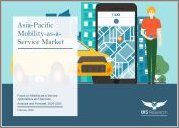
아시아태평양의 MaaS(Mobility-as-a-Service) 시장 규모는 2024년 377억 2,000만 달러에서 예측 기간 동안 25.99%의 CAGR로 성장하여 2033년에는 3,018억 달러에 달할 것으로 예상됩니다.
최첨단 디지털 플랫폼의 통합은 사용자 중심 서비스, 실시간 데이터 분석, 원활한 교통의 진보를 촉진하기 위해 이 지역의 MaaS 시장을 주도하고 있습니다. 강력한 공공-민간 파트너십과 이를 가능하게 하는 법률은 도시의 이동성을 향상시키고, 교통을 완화하고, 친환경 교통 수단을 장려하며, 효율성 향상과 더 나은 사용자 경험을 보장합니다.
| 주요 시장 통계 | |
|---|---|
| 예측 기간 | 2024-2033년 |
| 2024년 평가 | 377억 2,000만 달러 |
| 2033년 예측 | 3,018억 달러 |
| CAGR | 25.99% |
도시화, 스마트폰 보급률 증가, 효과적이고 친환경적인 교통수단에 대한 수요 증가 등이 아시아태평양 MaaS 시장의 폭발적인 성장에 기여하고 있으며, MaaS는 라이드 헤일링, 자전거 공유, 대중교통, 차량 대여 등 다양한 교통 서비스를 하나의 디지털 플랫폼으로 통합하여 단일 디지털 플랫폼에 통합하여 사용자 중심의 원활한 모빌리티 솔루션을 제공합니다.
교통량과 이산화탄소 배출량을 줄이기 위해 지역 전체 정부가 스마트 시티 프로젝트와 친환경 교통법을 적극적으로 지원하고 있습니다. 경로 최적화, 실시간 서비스 추적, MaaS 플랫폼은 5G 연결, 고속 인터넷, 고급 데이터 분석의 성장으로 더욱 개선되고 있습니다. 통합 모빌리티 솔루션에 대한 혁신과 투자는 강력한 민관 파트너십에 의해 촉진되고 있습니다.
자율주행 기술과 전기자동차(EV)의 보급 확대로 인해 MaaS 환경이 형성되고 있으며, 이는 업계 참여자들에게 새로운 비즈니스 기회를 제공하고 있습니다. 아시아태평양의 MaaS 시장은 저렴한 가격의 친환경 출퇴근 교통수단에 대한 수요가 증가하면서 아시아태평양의 도시 모빌리티에 혁명을 일으키며 지속적으로 성장할 것으로 예상됩니다.
아시아태평양의 MaaS(Mobility-as-a-Service) 시장을 조사했으며, 주요 동향, 시장 영향요인 분석, 법·규제 환경, 기술개발·특허 동향, 사례 분석, 시장 규모 추정 및 예측, 각종 부문별·주요 국가별 상세 분석, 경쟁 구도, 주요 기업 개요 등의 정보를 정리하여 전해드립니다.
시장 분류
세분화 1 : 용도별
세분화 2 : 서비스별
세분화 3 : 솔루션별
세분화 4 : 지역별
범위와 정의
Introduction to Asia-Pacific Mobility-as-a-Service Market
The Asia-Pacific mobility-as-a-service market was valued at $37.72 billion in 2024, and it is expected to grow at a CAGR of 25.99% and reach $301.80 billion by 2033. The integration of state-of-the-art digital platforms is propelling advancements in user-centric services, real-time data analytics, and seamless transportation, thereby propelling the Mobility-as-a-Service (MaaS) market in APAC. Robust public-private partnerships and enabling laws improve urban mobility, ease traffic, and encourage environmentally friendly transportation options, guaranteeing increased effectiveness and a better user experience.
Market Introduction
| KEY MARKET STATISTICS | |
|---|---|
| Forecast Period | 2024 - 2033 |
| 2024 Evaluation | $37.72 Billion |
| 2033 Forecast | $301.80 Billion |
| CAGR | 25.99% |
Growing urbanization, rising smartphone penetration, and the demand for effective, environmentally friendly transportation options are all contributing to the APAC Mobility-as-a-Service (MaaS) market's explosive expansion. MaaS offers smooth, user-focused mobility solutions by combining several transportation services, including ride-hailing, bike-sharing, public transportation, and vehicle rentals, into a single digital platform.
To cut down on traffic and carbon emissions, governments throughout the region are aggressively supporting smart city projects and environmentally friendly transportation laws. Route optimization, real-time service tracking, and MaaS platforms are being further improved by the growth of 5G connectivity, high-speed internet, and sophisticated data analytics. Innovation and investment in integrated mobility solutions are also being stimulated by robust public-private partnerships.
The MaaS landscape is also being shaped by the increasing use of autonomous transportation technologies and electric vehicles (EVs), which is opening up new business opportunities for industry participants. The APAC MaaS market is expected to continue growing as demand for affordable, environmentally friendly commuting options rises, revolutionizing urban mobility throughout the region.
Market Segmentation
Segmentation 1: by Application
Segmentation 2: by Service
Segmentation 3: by Solution
Segmentation 4: by Region
How can this report add value to an organization?
Product/Innovation Strategy: The product segment helps the reader understand the different applications of mobility-as-a-service based on application (passenger transportation, freight transportation, and micro-mobility), by service (on-the-go rides, carpool, ride hailing, logistics, renting, ride sharing, and others) and by solution (payment engines, navigation solutions, connectivity providers, ticketing solutions, and insurance solutions). The market is poised for significant expansion with ongoing technological advancements, increased investments, and growing awareness of the importance of mobility-as-a-service. Therefore, the mobility-as-a-service business is a high-investment and high-revenue generating model.
Growth/Marketing Strategy: The Asia-Pacific mobility-as-a-service market has been growing at a rapid pace. The market offers enormous opportunities for existing and emerging market players. Some of the strategies covered in this segment are mergers and acquisitions, product launches, partnerships and collaborations, business expansions, and investments. The strategies preferred by companies to maintain and strengthen their market position primarily include product development.
Competitive Strategy: The key players in the Asia-Pacific mobility-as-a-service market analyzed and profiled in the study include professionals with expertise in the automobile and automotive domains. Additionally, a comprehensive competitive landscape such as partnerships, agreements, and collaborations are expected to aid the reader in understanding the untapped revenue pockets in the market.
Key Market Players and Competition Synopsis
The companies that are profiled in the report have been selected based on inputs gathered from primary experts and analyzing company coverage, product portfolio, and market penetration.
Some of the prominent names in this market are:
Scope and Definition